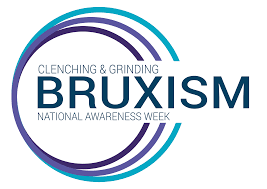The 9th Annual Bruxism Awareness Week runs from 22nd to 28th October 2018. 
Clenching or grinding of the teeth (bruxism to use the medical term), is thought to affect around 80% of adults.
Unfortunately, most people are unaware of grinding their teeth as it happens whilst sleeping and for many, there is no associated pain or symptoms. It can be noticed by a partner if they are not a heavy sleeper can be similar to the grating sound of nails on a chalkboard. Evidence of bruxism can often be seen by a dentist when examining the mouth.
Click to watch for advice on bruxism https://www.youtube.com/watch?v=X3heQSnaO_Y
Read more here:
For those who do have symptoms from bruxism, the most common ones are:
– Headaches and migraines
– Ear ache
– A stiff neck or jaw
– Tinnitus
– Damage to teeth
However many people do not associate this with a potential issue in the mouth and would often fail to mention these issues to a dentist. As a result, it is thought that bruxism is one of the most overlooked and underdiagnosed conditions.
Causes of bruxism
Unfortunately, often the cause of bruxism is not clear, which can also have an impact on people not seeking treatment. Some people suffer from bruxism every night and for others, it can be on and off.
Some of the more common know causes are:
– Stress and Anxiety – this is believed the be the single most common cause. People who have stress at work or home and often students who are under pressure with exams are more prone to bruxism
– Sleep disorders such as snoring and sleep apnoea, as well as those who suffer from regular disturbed sleep
– Lifestyle – smoking, alcohol and caffeine – possibly because of the effect they have on sleep
Treatment
If you notice yourself clenching during the day, especially when concentrating, it is very likely you are grinding the teeth at night.
You dentist may suggest an occlusal splint, which is custom made and designed to be worn when sleeping. There are various options available and your dentist will discuss what may be best for you.
There are a number of alternative treatment options such as muscle relaxation, cognitive behavioural therapy and botox.
What to do next
If you feel that you (or your partner) may be a bruxer, book in with your dentist for an assessment and advice on treatment. During October and November, at Brightside Dental we are offering 20% off all private nightguards.





